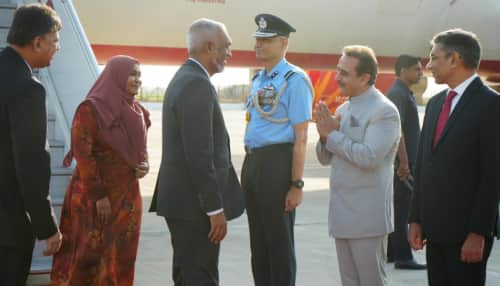- News>
- India
From `India Out` To `India In`? Maldives Prez Muizzu Arrives In Delhi To Seek Bailout Amid Economic Crisis

Maldives President Muizzu seeks Indian financial assistance to bolster the country`s foreign currency reserves as the island country stares at debt default.
Maldives President Mohamed Muizzu arrived in New Delhi late Sunday afternoon for a five-day state visit—his first since taking office—following an invitation from President Droupadi Murmu. Ahead of his visit, Muizzu in an interview with BBC, expressed confidence that India will provide financial assistance to help the island nation overcome its economic crisis . He is expected to request a bailout worth hundreds of millions of dollars.
The Maldives is facing a debt default, with foreign exchange reserves dwindling to $440 million, enough for only one-and-a-half months of imports. Muizzu told the BBC, "India is fully cognizant of our fiscal situation and will always be ready to ease our burden".
During his stay, Muizzu is scheduled to meet with President Murmu, Prime Minister Narendra Modi, and other senior Indian officials. External Affairs Minister S. Jaishankar will pay a courtesy call on the visiting dignitary, followed by a ceremonial reception at Rashtrapati Bhawan on Monday. Muizzu will also pay his respects at Rajghat, visiting Mahatma Gandhi's memorial, before engaging in bilateral discussions with PM Modi at Hyderabad House.
This visit marks a significant shift in Muizzu's stance, given his "India out" policy during his election campaign last year. Experts note that his reconciliatory tone is a departure from his previous rhetoric.
An Indian relief package could significantly bolster the Maldives' foreign currency reserves. However, just last month, Moody’s downgraded the Maldives' credit rating, stating that “default risks have risen materially.” Despite this, Muizzu reassured the BBC that his administration does not foresee a sovereign debt default and is opting against joining an International Monetary Fund (IMF) program to tackle the crisis. “We have our own home-grown agenda,” he insisted.
Still, analysts point out that the Maldives' foreign reserves are notably below the government’s external debt service obligations, projected at around $600 million in 2025 and over $1 billion in 2026. This brings urgency to Muizzu’s visit to Delhi, especially since India has already extended financial support worth $1.4 billion for various infrastructure and development projects.
Since Muizzu took office in November 2023, ties between Male and Delhi have become increasingly strained. He initially chose to visit Turkey and China, with the latter trip in January seen as a deliberate snub to India. Tensions escalated further after derogatory comments about Prime Minister Narendra Modi surfaced from three Maldivian officials.
Shortly after taking office, Muizzu issued an ultimatum for India to withdraw around 80 troops stationed in the Maldives, which Delhi had deployed to maintain two rescue helicopters and a Dornier aircraft donated years ago. Eventually, both countries reached a compromise, agreeing to replace the troops with Indian civilian technical staff.
Additionally, Muizzu's administration decided not to renew a hydrographic survey agreement with India, a move that raised eyebrows. Defending his decisions, he said, “The decisions taken are based on our evolving domestic interests and strategic priorities, reflecting the will of the people who elected me 10 months ago.”
Despite moves that some interpret as an attempt to diminish India’s influence and strengthen ties with China, Muizzu insists his foreign policy is centered on “Maldives First.” Speaking to BBC, he said “Our relationships with other nations are guided by principles of mutual respect and trust, non-interference, and the pursuit of peace and prosperity.”
Some of Muizzu's actions, like permitting the port call of the Chinese research ship Xiang Yang Hong 3, sparked concerns in Delhi, with fears that the data collected could be used by the Chinese military for submarine operations. Nevertheless, Muizzu dismisses any claims of pro-China leanings.
